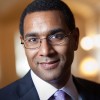May is always one of my favorite months at Kenyon, as we gear up to celebrate graduates at Commencement (this year, two classes in a row) and welcome back thousands of alumni for Reunion. I’m excited to hear what investigative journalist Sheila Coronel has to say about her work furthering freedom of the press in the Philippines when she addresses the Class of 2022. But even before that, I’m looking forward to events tonight and tomorrow that will honor key principles of free speech and expression, as Kenyon presents the Leopoldo López Freedom and Democracy Award, named in honor of one of the College’s most passionate and inspiring alumni. I highly encourage the campus community to attend a conversation titled “The Global Struggle for Democracy” with López in the Hill Theater at 7:30 this evening — this will be his first return to Kenyon since gaining his freedom — and to join us for the award bestowal ceremony in Rosse Hall Thursday at 7 p.m.
This year’s López Award will be presented to journalist Carlos Chamorro on behalf of the many Nicaraguan exiles and political prisoners, including two of Chamorro’s own siblings, who have had their freedoms violated or their lives taken by that country’s government, considered by political scientists to be the most authoritarian regime in the Western Hemisphere. I’m very grateful that those of us at Kenyon will have the opportunity to hear from López, Chamorro and Berta Valle, a Nicaraguan human rights activist whose husband is also a prisoner, about the firsthand experiences of those fighting so hard and sacrificing so much for rights that we may take for granted. This is especially important because we know that, in a time of severe challenges to democracy all around the world, these rights are not guaranteed in perpetuity in any corner of the globe.
I’ve also been thinking about how we can live up to those same values of free speech here in Gambier. The struggles of activists in Nicaragua, Venezuela or dozens of other countries remind us that our own issues at Kenyon have considerably lower stakes, even when it might not feel that way on campus. But as an institution committed to the liberal arts and freedom of expression, it’s important to model within our own classrooms and conversations the principles that we wish to see in the wider world.
I have written in the past about the importance of dissenting views on college campuses. One of the most important parts of a Kenyon education is learning to forge agreement within our community about how to respectfully discuss controversial issues — not censoring ourselves into silence because it’s easier to say nothing at all, but speaking thoughtfully in order to create a climate where everyone feels comfortable contributing. We must also realize that navigating difficult conversations means making mistakes, and thus requires finding space for grace, understanding and forgiveness.
In the U.S., we often use the phrase “freedom of speech” colloquially to refer to broader social contexts, not the constitutional protection from the repressive regimes found in places like Nicaragua, Venezuela or Russia. But democracy depends on the free exchange of ideas and active debate of issues, habits that get formed when practiced in all sorts of contexts, so we should be concerned about the erosion of free expression even in the absence of governmental repression.
The data on the current state of free expression in the U.S. in a recent New York Times/Siena College poll are stunning, with 55% of Americans stating that they had “held their tongue” because of concern about criticism or retaliation, and 46% reporting that they feel less free now than 10 years ago to express viewpoints on politics. These numbers resonate with articles published on campus in the Collegian and The Middle Path magazine describing a chilling atmosphere for expressing politically conservative viewpoints.
Without space for respectful and honest conversations that neither fade into silence nor devolve into heated rhetoric and personal attacks, we lose a critical element of a free society — the ability to engage, discuss and share with each other in an energetic and intellectually curious way — and we weaken the foundation of our democracy. Let us follow in the model of our speakers this month, adopting both their courage as voices of dissent and their hopeful insistence that we can create a world where differing points of view are engaged, not silenced.
